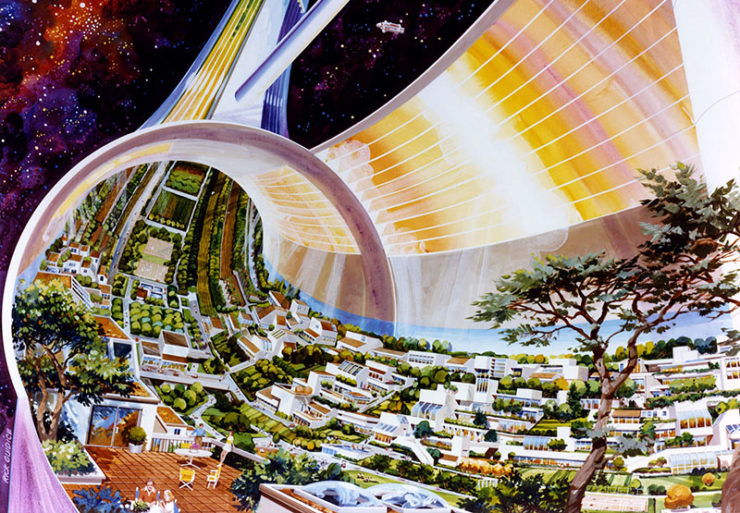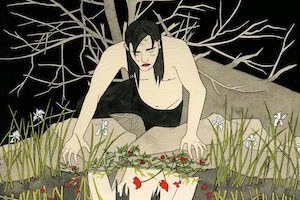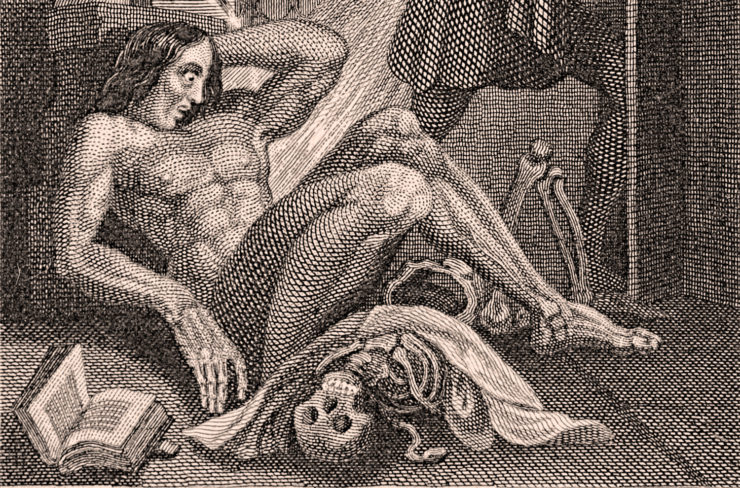In the midst of a continuing pandemic, social injustice, and climate disasters, it’s community building that keeps giving me hope—both on and off the page. I’m drawn to books that feature people working together rather than the individual hero’s journey. I want to read and write books that demonstrate what a healthy, thriving community looks like.
It is my desire to build and find community to push back against injustice that led me to writing in both the genres I’m currently working in, solarpunk and urban fantasy. While they might seem at opposite ends of the SFF spectrum, both subgenres focus on belonging and using that community as a survival tool, whether it’s climate change or vampire politics.
The SFF genre has a unique space to imagine not only communities but what the community response might be to oppression. Sometimes, I want my SFF to be cozy in the depiction of community. Other times, I want a group of revolutionaries to burn it all down. The following five examples have a bit of both.
Babel by R. F. Kuang
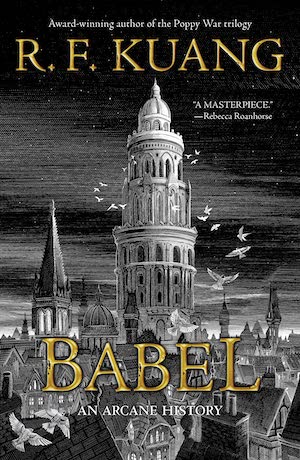
Like many examples from the dark academia genre, Babel by R. F. Kuang has a large cohort of characters to make this alternate Oxford come alive. Where Kuang’s novel fulfills the genre is her depiction of academia’s foundation of white supremacy and colonization—and the radical resistance groups that form against it.
Stolen from his home in Canton, Robin feels alienated and isolated until he meets his cohort at the prestigious Royal Institute of Translation. Together, Robin, Ramy, Letty, and Victoire study how translating words between languages creates magic that can be engraved on silver bars. In order to always make new magical pairings, more languages must be acquired and studied from different parts of the world.
As Robin and his cohort have experienced, language and translation has been a favorite tool of the British Empire. Robin is tapped by the underground Hermes Society to help disrupt and resist the Empire’s colonization. Now, not only does Robin feel seen, but he also has the chance to do the translation work he’s been trained for to resist rather than support. While his cohort at the institute have become his family, the Hermes Society encourages him to think beyond Oxford. With their friendship, he realizes the global impact of not just the translation work, but also of resistance. This small group has aided communities in other places in the mission to slow or push back the British Empire, and now Robin has that opportunity, too.
With this larger circle of friends and support, Robin realizes his story is bigger than just passing his next exam but could slow colonization. From cozy tea shops to heated conversations in pubs, Kuang demonstrates how friends become family become rebels.
No Gods, No Monsters by Cadwell Turnbull
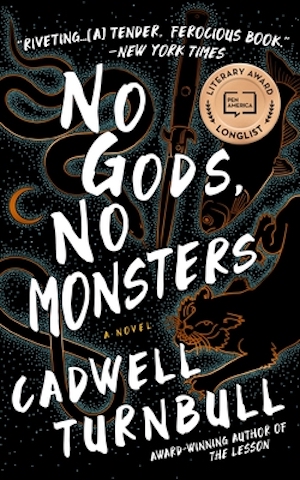
Cadwell Turnbull clearly has radical community building in mind from the word play in the title (no gods, no masters) to the story’s central worker-owned bookstore named Anarres after Ursula K. Le Guin’s The Dispossessed. In this meta urban fantasy novel, monsters reveal themselves to the rest of the world, but that moment is juxtaposed as just as disruptive as the police brutality visited on Laina’s family when her brother, a werewolf, is murdered by the Boston police.
Told through an omniscient narrator, the revelation of monsters and magic being real disrupts communities but also creates space for new friendships and families to form. It is a werewolf pack that first attempts to demonstrate the existence of magic by transforming together on a highway, stopping traffic. Conversely, the worker-owned bookstore creates a place for humans and “monsters” to come together and work through the revelation and the difficulties it poses. Supporting each other becomes more than kind words but attending protests and being willing to put their bodies on the line.
Another group with more unique abilities works to rescue other so-called monsters who are being abused by humans for their magical purposes. For others, the reveal of magic prompts them to find other believers online.
Turnbull also demonstrates that the most likely outcome of magic and monsters making an appearance is—nothing. Rather, the world would revert to the belief that, somehow, it had all been faked in order to preserve a certain way of living—for better or worse. It is through subversive community, whether that’s a shifter pack or a worker-owned bookstore, that people move beyond denial.
A Psalm for the Wild-Built by Becky Chambers
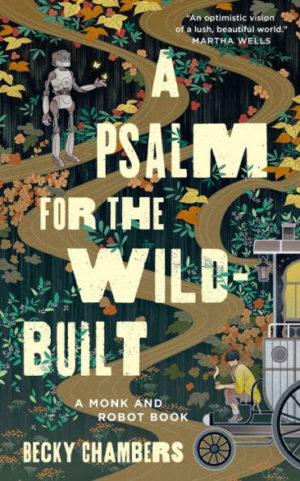
Becky Chambers’ novella demonstrates that creating new communities is just as important as the social and economic worldbuilding in A Psalm for the Wild-Built. Sibling Dex finds themself searching for meaning in a world that is already thriving.
Chambers poses the question: what does a fulfilling life look like when capitalism and false scarcity no longer dictate survival or meaning? As part of Dex’s search, they leave their home community in the City and practice tea service, creating space for people to relax or experience cathartic emotion, in different communities around Panga. Each of these places are in balance with the rest of the living world, such as solar farms built in the Shrublands or the hanging homes in Inkhorn.
This harmony does not dismiss the struggles humans have. As part of the tea service, some people talk to Dex, others read books, some cry, but there’s a sense of release that comes with the service.
Ultimately, Dex finds meaning in a new relationship, the start of building bridges between two communities: the human and the nonhuman. In hope of hearing crickets, Dex wanders beyond human settlements into protected wilderness, where they meet Mosscap, a robot. Mosscap approaches the human world with a question: “What do humans need?” This question, while simple, opens the door for him to build connections with the new species he finds himself in community with–at first, Dex. While building friendship across species lines, Dex finds meaning in building their relationship with Mosscap.
Taggerung by Brian Jacques
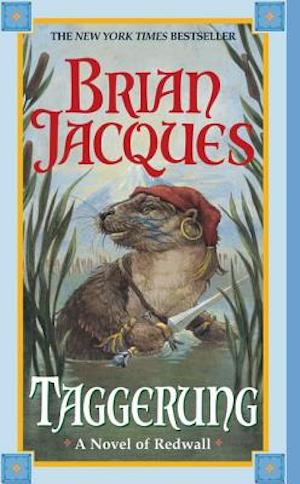
Radical might not seem like an obvious adjective for the Redwall series, but over twenty-two books, Brian Jacques depicts multiple communities built around friendship, found family, kindness, and intentional living.
In Taggerung, Redwall is without an abbess or protecting warrior. The adventurous part of the story follows the stolen otter pup Deyna, raised to adulthood believing he was the chosen warrior for a band of rogues. Abhorring unnecessary violence, he eventually escapes but is pursued by his former friends. Eventually, all roads lead to Redwall, but along the way he becomes friends with the fieldmouse Nimbalo, and they race to stay one step ahead of the rogues.
On the cozier side, the creatures of Redwall are concerned that no abbess has been appointed after their previous beloved Abbess Song passed away. The young otter Mhera uncovers a series of riddles from the former abbess and enlists her mentor, the elder badger Cregga Rose Eyes, for help solving the puzzles since she’d been a dear friend of the former abbess. Eventually, all of Redwall becomes involved in solving the riddles in honor of Abbess Song.
Over the course of the book, the day-to-day operations of the abbey are completed in a decentralized manner by practiced hands, such as the gardening and cooking, but there’s always room for someone to learn, such as the aging Sister Alkanet, who used to organize the infirmary taking on a new passion by working with the cellarkeeper Drogg. Throughout the book, the creatures of Redwall come together in celebration and in grief, in moments of peace and in moments of bravery.
Parable of the Sower by Octavia Butler
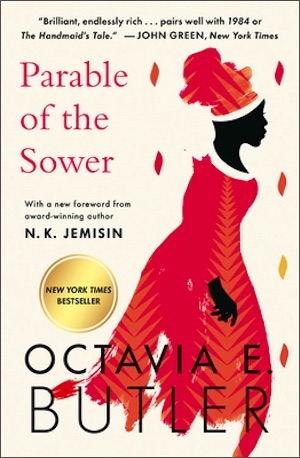
Butler’s classic dystopia demonstrates that community is vital to surviving social collapse. As a teenager, Lauren doesn’t believe her community in a walled cul-de-sac is prepared for the worsening social and environmental issues. The community led by her Baptist preacher father is focused on the past, and the idea that the world might return to the “good old days.”
Lauren believes the only way to prepare for disaster is to read the future by examining what has happened to the communities around them and changing to adapt and prepare. When her community is destroyed by people outside the walls, she takes to the road in search of a new home. She gathers two survivors, but while she is wary of others, she soon attracts people to her group. The community forms around kindness as a method for survival. At first Lauren is wary of others, but when she trusts her instincts to help people–such as two young parents with a baby–she attracts her strongest supporters. Rather than focusing on people with resources, she embraces those who need the help of others.
This need and desire to move beyond just survival to some sort of hopeful future gathers a diverse group of people to Lauren.In addition to a strong, trusting community, Lauren shares her spiritual belief called Earthseed, a religion based on the idea that “god is change” and that such change can be shaped. Lauren shapes change in her life by growing her community and finding a place to build a permanent home called Acorn. There, Lauren plans to live sustainably while strengthening the community by encouraging new skills, new friendships, and welcoming those in need.
Phoebe Wagner is an author, editor, and academic writing at the intersection of speculative fiction and climate change. Her debut novel A Shot of Gin is forthcoming from Parliament House Press (2023), and her novella When We Hold Each Other Up is forthcoming from Android Press (2023). She is the editor of three solarpunk anthologies, including Sunvault: Stories of Solarpunk & Eco-Speculation. Wagner holds a PhD in literature, and she is an Assistant Professor of Creative Writing at Lycoming College in Pennsylvania. Follow her at phoebe-wagner.com.










